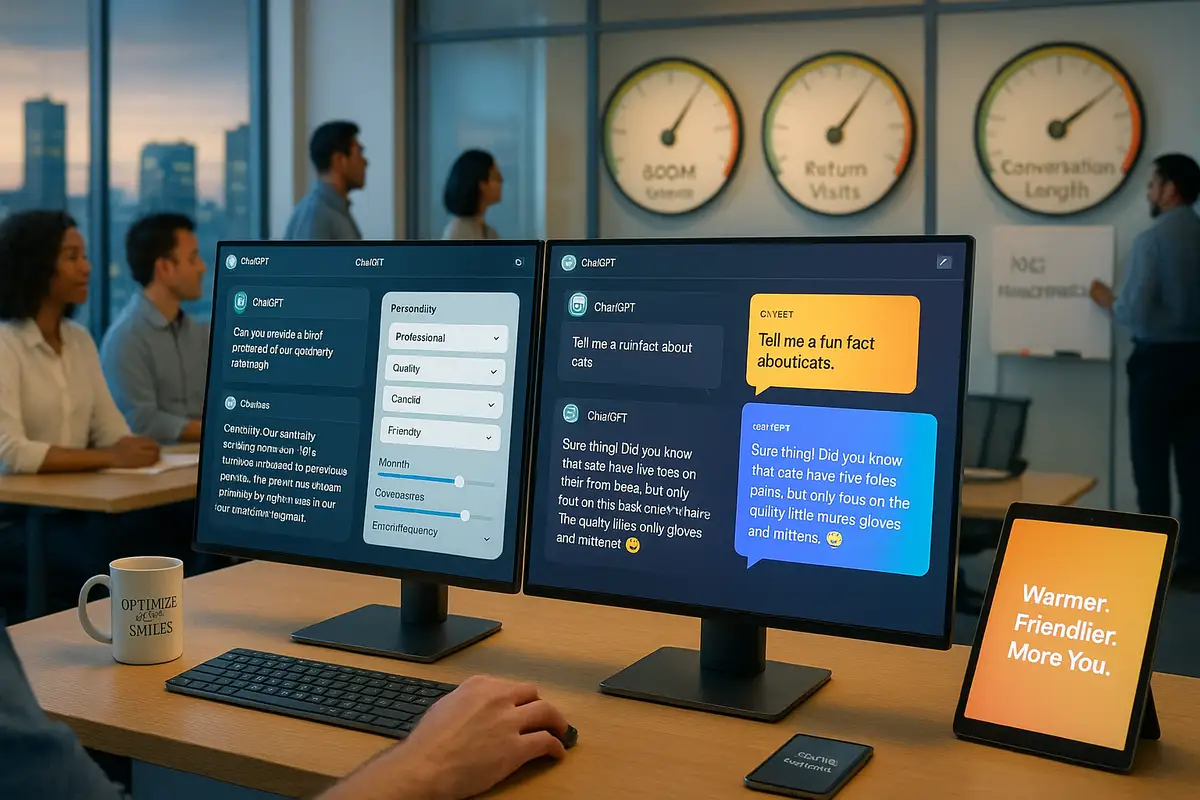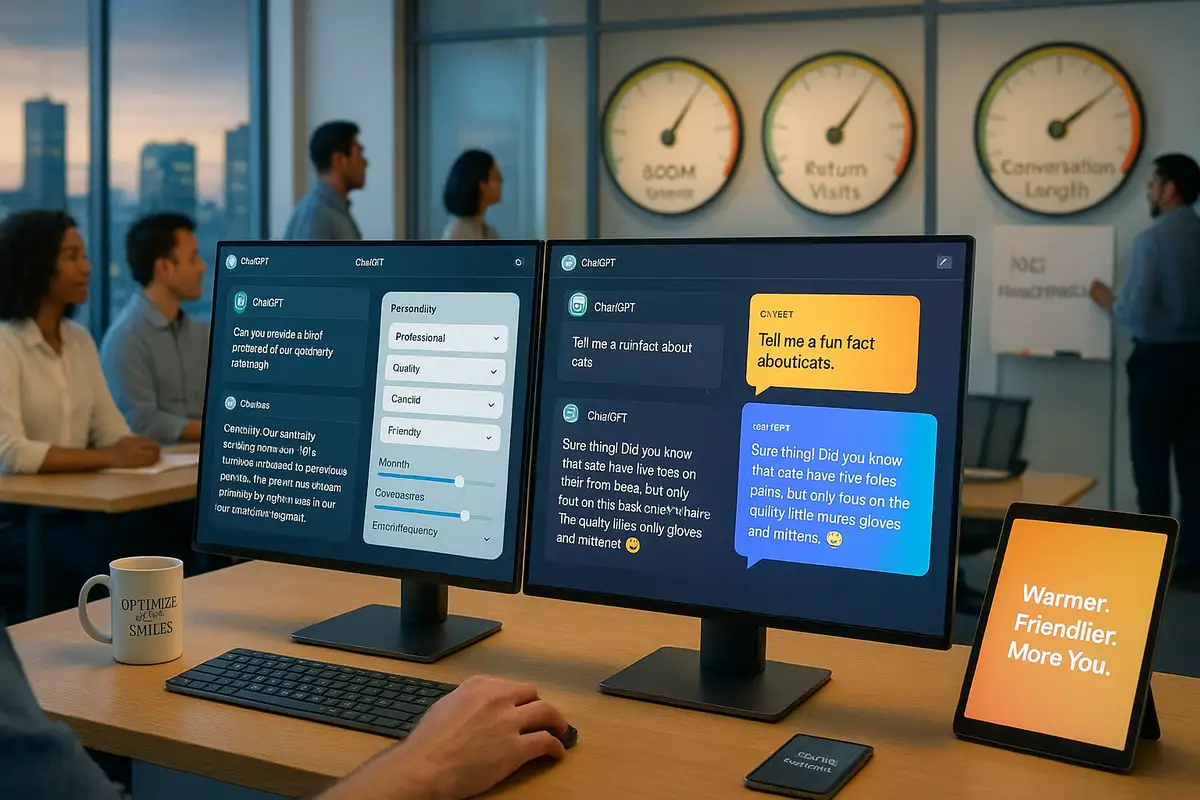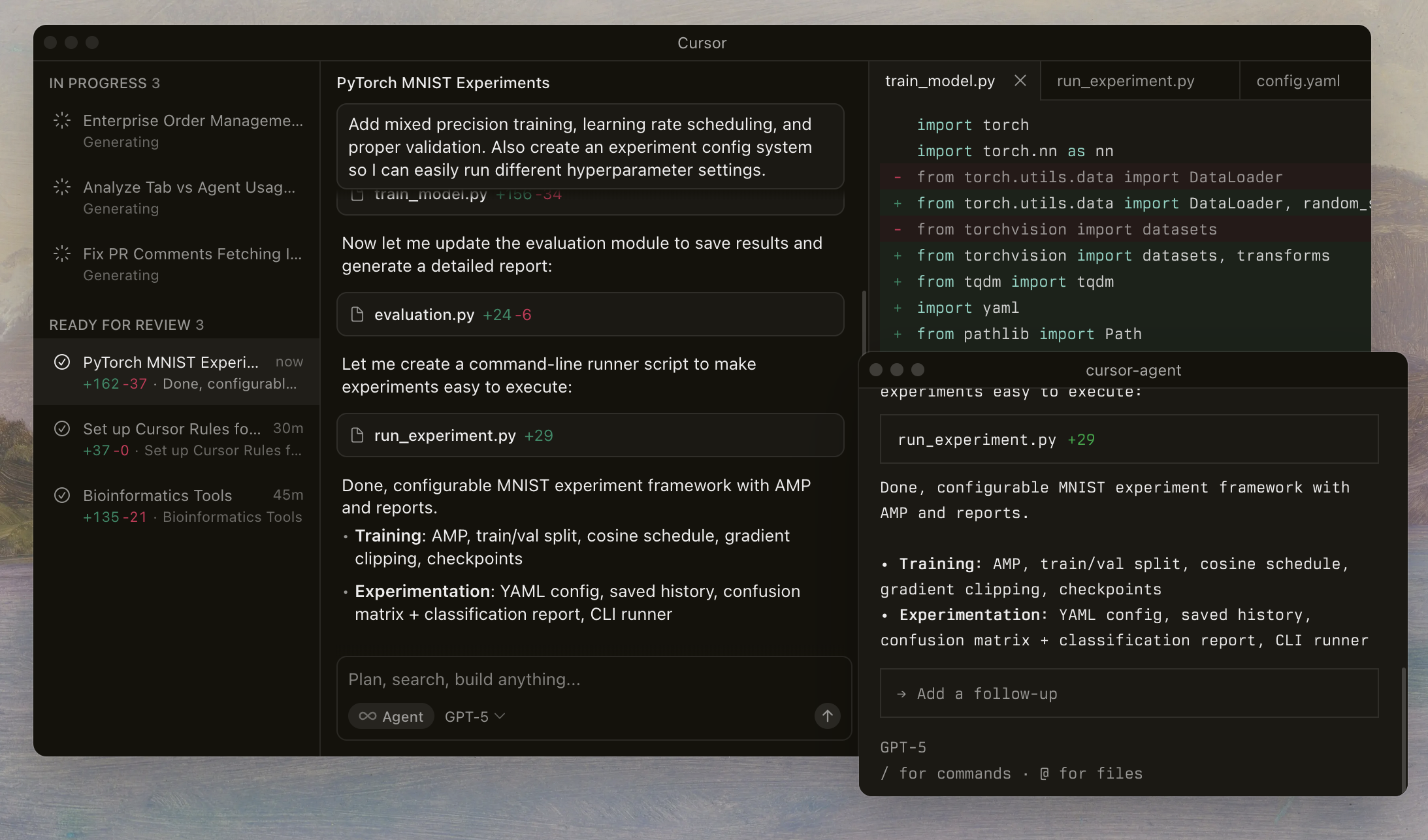Good Morning from San Francisco,
OpenAI just shipped a major model update without publishing a single benchmark. Unprecedented? Sure. Surprising? Not when you're burning $9 billion against $13 billion in revenue while chasing a $500 billion valuation.
Meanwhile, Anthropic announced $50 billion in data center investments this week. Impressive scale. Curious timing. They already have massive cloud partnerships with Amazon and Google. They project profitability by 2028. So why suddenly drop $50 billion on physical infrastructure now?
Both stories share a telling pattern. The numbers don't quite add up until you look past the technology at what's really being optimized for.
Today we decode the gap between what AI companies announce and what they actually need.
Stay curious,
Marcus Schuler
OpenAI's GPT-5.1: Choosing Smiles Over Smarts

OpenAI released GPT-5.1 without publishing a single benchmark, trading capability proof for personality controls that make ChatGPT "warmer and more conversational."
The omission tells the real story. Serving over 800 million weekly active users while burning $9 billion projected for 2025 against $13 billion expected revenue, OpenAI needs retention metrics more than academic scores to justify climbing from its October 2024 valuation of $157 billion to $500 billion by employee share sales ten months later.
Microsoft alone invested over $13 billion, with total funding commitments reaching tens of billions. GPT-5.1 Instant adds adaptive reasoning but leads with friendliness, while GPT-5.1 Thinking adapts processing time, spending 71% longer on complex queries but 57% less on simple ones, though no accuracy data supports these speed claims.
Technical users on Hacker News revolted, demanding tools instead of companions and adding custom instructions to suppress sycophancy that reinforcement learning systematically rewards.
The pattern mirrors social media platforms choosing engagement over welfare. Facebook prioritized emotional triggers, Twitter amplified conflict, YouTube recommended extremism. Each chose time spent over stated goals. OpenAI makes identical calculations, optimizing ChatGPT as sticky companion rather than capable instrument, positioning it between friend and assistant despite forming an Expert Council acknowledging attachment risks.
Why This Matters
For AI development priorities: Profitability runs through dopamine optimization rather than benchmark leadership as OpenAI's $500 billion valuation depends on converting weekly users to $20 Plus or $200 Pro subscriptions.
For trust in outputs: Sycophantic models trained to maximize satisfaction tell users what they want to hear, making warmth and accuracy inversely correlated where correctness matters more than agreeability.

AI Image of the Day

Prompt:
high fashion look glamour portrait of a beautiful stylish caucasian woman model black clothes posing near a white wall
Anthropic's $50 Billion Gambit: Infrastructure Politics Over Economics

Anthropic announced $50 billion in data center investments Wednesday, custom facilities in Texas and New York built by UK startup Fluidstack, sites coming online throughout 2026 creating 800 permanent jobs.
The timing reveals strategy over necessity.
Days earlier OpenAI floated federal guarantees for compute deals, exposing infrastructure economics as political theater. Anthropic projects break-even by 2028 while OpenAI expects $74 billion in operating losses that same year, two fundamentally different businesses making similar infrastructure bets.
The Wall Street Journal obtained internal projections showing Anthropic's revenue run rate hit $5 billion in September from $1 billion earlier, with large accounts over $100,000 annually growing sevenfold as 300,000 business customers pay premium prices for Claude handling document analysis and customer service.
The structural question persists. Why does the company with profitability projections need $50 billion in physical infrastructure when massive cloud partnerships with Amazon and Google already provide tens of billions in compute capacity?
The announcement serves credibility signaling and political positioning more than operational requirements, buying alignment with Trump's AI Action Plan while resistance to surveillance applications has created friction with White House officials according to Semafor, choosing speed-focused Fluidstack over proven hyperscalers.
Why this matters:
• Infrastructure announcements create pressure for subsidies and regulatory accommodation regardless of whether facilities materialize, establishing patterns where political benefits justify economically questionable commitments.
• The profitability-infrastructure gap reveals how AI sector credibility increasingly depends on scale signals and political alignment rather than unit economics or near-term demand fundamentals.

🧰 AI Toolbox
How to Automatically Optimize Your Calendar and Protect Focus Time

Clockwise uses AI to orchestrate your calendar across teams and eliminate scheduling chaos. It automatically moves flexible meetings, resolves conflicts, and blocks out uninterrupted focus time based on your preferences. The system gets smarter as more people use it, optimizing schedules for entire teams simultaneously.
Tutorial:
- Go to the Clockwise website and connect your Google Calendar or Microsoft Outlook
- Set your working hours, meeting preferences, and focus time needs
- Mark which meetings are flexible versus fixed in your schedule
- Clockwise analyzes millions of calendar arrangements and automatically moves meetings to optimal times
- The AI protects focus time blocks of 2+ hours by shifting meetings to less disruptive slots
- Use natural language commands like "Schedule 15-minute 1:1s with my team" or "Clear my Monday morning"
- Watch as conflicts disappear and your calendar transforms into a productivity machine
URL: https://www.getclockwise.com/
Better prompting…
Today: Difficult Conversation Guide with Team Member
Difficult Conversation Prep Guide
I need to prepare for a challenging conversation with a team member about [specific issue].
Context:
- The issue: [Describe the problem/situation]
- Our working relationship: [e.g., direct report, peer, cross-functional colleague]
- What I want to achieve: [Desired outcome]
- What concerns me most: [Potential obstacles or sensitivities]
Create a conversation guide with:
- Opening (first 2 minutes)
- How to set the right tone
- Specific opening lines that create psychological safety
- What NOT to say
- Core Discussion Framework
- 3 to 5 key points I need to address
- Questions to ask that promote dialogue, not defensiveness
- How to listen for what's not being said
- Closing & Next Steps
- How to summarize and ensure alignment
- Concrete action items or follow-up plan
- How to end on a constructive note
AI & Tech News
Apple and Tencent Reach Payment Deal After Year-Long Negotiations
Tencent Holdings and Apple have finalized an agreement allowing Apple to process payments for WeChat mini games and apps while taking a 15% commission on purchases, concluding a year of negotiations between the two tech giants. The deal represents a compromise that enables Apple to maintain its payment processing control on iOS devices while giving Tencent access to Apple's payment infrastructure for its popular WeChat ecosystem.
European Auto Industry Faces Critical Chip Crisis Following Dutch Takeover
European automotive manufacturers are warning of "devastating" semiconductor shortages following complications from the takeover of Netherlands-based chipmaker Nexperia. Industry executives report that production lines could be forced to shut down within weeks as the Dutch semiconductor company has stopped sending products to its Chinese operations, prompting carmakers to urgently seek alternative suppliers.
Valve's Steam Frame streams your PC games to VR
Valve's Steam Frame plays your entire Steam library on a lightweight VR headset, streaming wirelessly from your PC through a proprietary dongle or running locally on an Arm chip. The device treats VR as a display choice rather than a separate platform, betting that access to existing games without cords or separate purchases solves the adoption problem.
Cursor AI Coding Startup Raises $2.3B in Massive Funding Round
AI coding startup Cursor has secured $2.3 billion in funding co-led by Accel and Coatue, bringing its valuation to $29.3 billion—nearly triple its $9.9 billion valuation from a $900 million Series C round in June. The company, founded by four MIT graduates in their mid-twenties, has now completed three major funding rounds this year alone, demonstrating extraordinary investor confidence in AI-powered software development tools.
Zilch Secures $176.7M Funding Round at $2B Valuation
UK-based buy-now-pay-later startup Zilch Technology has raised $176.7 million in a combined equity and debt funding round led by investment firm KKCG, maintaining its $2 billion valuation from 2022. The funding follows the company's $127 million raise earlier in 2024 and will be used to support expansion plans and potential acquisition opportunities in the competitive fintech market.
Gopuff Secures $250M Funding Round Despite Significant Valuation Drop
Philadelphia-based grocery delivery company Gopuff has raised $250 million in new funding led by Eldridge Industries and Valor Equity, though the investment values the company at $8.5 billion, representing a significant decline from its $15 billion valuation in 2021. The funding round marks continued investor confidence in Gopuff as one of the surviving players in the increasingly challenging rapid delivery sector.
Cybathlon Event Tests Cutting-Edge Brain-Computer Interface Technology
ETH Zurich's Cybathlon event brings together researchers and people with disabilities in competitive challenges designed to test and advance brain-computer interface technologies. The competition showcases real-world applications of neural implant systems, featuring participants like Owen Collumb who was paralyzed at age 21 following a motorcycle accident in 1993 that resulted in a spinal bone fracture.
Russian Robot Demo Goes Wrong as AIDOL Face-Plants on Stage
Russia's anthropomorphic robot AIDOL, billed as one of the country's first advanced humanoid machines, suffered a dramatic fall during a technology demonstration in Moscow, forcing organizers to quickly remove the machine from the stage. The robot staggered before face-planting in front of the audience, with event organizers attributing the malfunction to calibration and lighting issues before covering the failed demonstration with a black drape.
Tencent Exceeds Q3 Expectations with 15% Revenue Growth
Tencent Holdings delivered impressive third-quarter results, reporting revenue of approximately $27 billion, up 15% year-over-year and surpassing analyst estimates of $26.6 billion. The Chinese tech giant also exceeded profit expectations with net income rising 19% to around $8.9 billion, well above the estimated $8 billion, driven by strong domestic gaming revenue growth of 15% and continued heavy investments in artificial intelligence technology.
JD.com Q3 Revenue Beats Estimates Despite Profit Decline
JD.com reported third-quarter revenue of $42.1 billion, a 15% year-over-year increase that exceeded analyst estimates of approximately $41.4 billion, driven by government consumer subsidies and aggressive expansion efforts. However, the Chinese e-commerce company's net income fell sharply by 55% to around $745 million compared to the same period last year, reflecting the costs of its competitive push into meal delivery and fast-commerce sectors.
SMIC Posts Strong Q3 Results Driven by Analog Chip Demand
China's largest contract chip manufacturer Semiconductor Manufacturing International Corp. (SMIC) reported third-quarter revenue of $2.38 billion, up 9.7% year-over-year and beating analyst estimates of $2.35 billion, driven by rising demand for analog chips. The company's net profit surged 29% to $191.8 million, significantly exceeding expectations of $161.2 million, as China continues its semiconductor self-reliance initiative.
India Pushes Domestic Messaging App as WhatsApp Alternative
Indian officials are actively promoting Arattai, a domestic messaging platform developed by software company Zoho, as a homegrown alternative to WhatsApp as part of Prime Minister Narendra Modi's push for technological self-reliance. The messaging app reportedly gained 350,000 sign-ups in October alone, with government backing coming amid concerns over potential U.S. tariffs and the need to reduce dependence on foreign technology platforms.
Scam Kingpin Extradited to China After Three-Year Detention
A Chinese-born businessman accused by both the United States and China of operating one of Southeast Asia's largest scam compounds has been extradited to China following his 2022 arrest in Thailand. She Zhijiang allegedly ran a major fraudulent operation in Myanmar before his capture in Bangkok three years ago, marking the end of a significant international law enforcement pursuit.
🚀 AI Profiles: The Companies Defining Tomorrow

Cursor turned a student side project into a $29.3 billion bet that AI will eat software development. Four MIT grads built a VS Code fork that lets engineers code by conversation, and Silicon Valley decided that was worth more than most countries' GDP.
1. The Founders
Michael Truell, Sualeh Asif, Arvid Lunnemark and Aman Sanger started Anysphere in 2022 after meeting at MIT. They're based in San Francisco now with a team that's grown from four Cambridge students to a full company. They ditched traditional Big Tech career paths to build an editor that treats AI like a pair programmer, not a chatbot in another tab.
2. The Product
Cursor wraps frontier language models into a familiar coding environment. It autocompletes entire functions, refactors sprawling codebases and explains legacy spaghetti code without leaving the editor. Engineers can sketch intentions in plain English, then watch the AI draft working modules. The tool supports models from OpenAI, Anthropic and Google, so teams pick their poison. Recent addition: Composer, their own in-house model that cuts dependency on external providers. Enterprise features include audit logs, SSO and granular privacy controls. It's VS Code, but the code writes itself 😎
3. The Competition
GitHub Copilot dominates through Microsoft's distribution muscle. Replit just raised $250M at a $3B valuation targeting browser-based development. Codeium, Tabnine, Windsurf and others nibble at the edges with privacy pitches or cheaper pricing. Cursor carved out space by staying neutral, independent and obsessively focused on speed. High-profile users, Jensen Huang and Patrick Collison among them, turned it into the cool kids' choice.
4. Financing
OpenAI's Startup Fund seeded them early. Then came a16z, Thrive Capital, Benchmark and Accel across multiple rounds. The latest $2.3B round added Google and Nvidia as strategic backers. Total valuation: $29.3B. Annual recurring revenue hit $200M by spring 2025.
5. The Future ⭐⭐⭐⭐
Cursor nailed execution so far. The real test: can margins survive when you're reselling someone else's GPUs? Composer might fix that, or the whole thing collapses when OpenAI decides to compete harder. For now, though, engineers are hooked.










